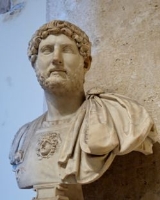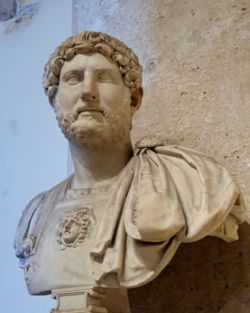
Publius Annius Florus
Encyclopedia
Publius Annius Florus, Roman
poet
and rhetoric
ian, identified by some authorities with the historian Florus
.
The introduction to a dialogue called Virgilius orator an poeta is extant, in which the author (whose name is given as Publius Annius Florus) states that he was born in Africa
, and at an early age took part in the literary contests on the Capitol
instituted by Domitian
. Having been refused a prize owing to the prejudice against African provincials, he left Rome in disgust, and after travelling for some time set up at Tarraco
as a teacher of rhetoric.
 Here he was persuaded by an acquaintance to return to Rome, for it is generally agreed that he is the Florus who wrote the well-known lines quoted together with Hadrian
Here he was persuaded by an acquaintance to return to Rome, for it is generally agreed that he is the Florus who wrote the well-known lines quoted together with Hadrian
's answer by Aelius Spartianus (Hadrian I 6). Twenty-six trochaic tetrameters, De qualitate vitae, and five graceful hexameters, De rosis, are also attributed to him.
Florus is important as being the first in order of a number of 2nd century African writers who exercised a considerable influence on Latin
literature, and also the first of the poetae neoterici
or novelli (new-fashioned poets) of Hadrian's reign, whose special characteristic was the use of lighter and graceful metres (anapaestic and iambic dimeters), which had hitherto found little favour.
The little poems will be found in E. Bahrens, Poëtae Latini minores (1879–1883); for an unlikely identification of Florus with the author of the Pervigilium Veneris
see E. H. O. Müller, De P. Anino Floro poéta et de Pervigilio Veneris (1855), and, for the poet's relations with Hadrian, Franz Eyssenhardt
, Hadrian und Florus (1882); see also Friedrich Marx
in Pauly-Wissowa's Realencyclopädie, i. pt. 2 (1894).
Roman Empire
The Roman Empire was the post-Republican period of the ancient Roman civilization, characterised by an autocratic form of government and large territorial holdings in Europe and around the Mediterranean....
poet
Poet
A poet is a person who writes poetry. A poet's work can be literal, meaning that his work is derived from a specific event, or metaphorical, meaning that his work can take on many meanings and forms. Poets have existed since antiquity, in nearly all languages, and have produced works that vary...
and rhetoric
Rhetoric
Rhetoric is the art of discourse, an art that aims to improve the facility of speakers or writers who attempt to inform, persuade, or motivate particular audiences in specific situations. As a subject of formal study and a productive civic practice, rhetoric has played a central role in the Western...
ian, identified by some authorities with the historian Florus
Florus
Florus, Roman historian, lived in the time of Trajan and Hadrian.He compiled, chiefly from Livy, a brief sketch of the history of Rome from the foundation of the city to the closing of the temple of Janus by Augustus . The work, which is called Epitome de T...
.
The introduction to a dialogue called Virgilius orator an poeta is extant, in which the author (whose name is given as Publius Annius Florus) states that he was born in Africa
Africa
Africa is the world's second largest and second most populous continent, after Asia. At about 30.2 million km² including adjacent islands, it covers 6% of the Earth's total surface area and 20.4% of the total land area...
, and at an early age took part in the literary contests on the Capitol
Capitoline Hill
The Capitoline Hill , between the Forum and the Campus Martius, is one of the seven hills of Rome. It was the citadel of the earliest Romans. By the 16th century, Capitolinus had become Capitolino in Italian, with the alternative Campidoglio stemming from Capitolium. The English word capitol...
instituted by Domitian
Domitian
Domitian was Roman Emperor from 81 to 96. Domitian was the third and last emperor of the Flavian dynasty.Domitian's youth and early career were largely spent in the shadow of his brother Titus, who gained military renown during the First Jewish-Roman War...
. Having been refused a prize owing to the prejudice against African provincials, he left Rome in disgust, and after travelling for some time set up at Tarraco
Tarragona
Tarragona is a city located in the south of Catalonia on the north-east of Spain, by the Mediterranean. It is the capital of the Spanish province of the same name and the capital of the Catalan comarca Tarragonès. In the medieval and modern times it was the capital of the Vegueria of Tarragona...
as a teacher of rhetoric.

Hadrian
Hadrian , was Roman Emperor from 117 to 138. He is best known for building Hadrian's Wall, which marked the northern limit of Roman Britain. In Rome, he re-built the Pantheon and constructed the Temple of Venus and Roma. In addition to being emperor, Hadrian was a humanist and was philhellene in...
's answer by Aelius Spartianus (Hadrian I 6). Twenty-six trochaic tetrameters, De qualitate vitae, and five graceful hexameters, De rosis, are also attributed to him.
Florus is important as being the first in order of a number of 2nd century African writers who exercised a considerable influence on Latin
Latin
Latin is an Italic language originally spoken in Latium and Ancient Rome. It, along with most European languages, is a descendant of the ancient Proto-Indo-European language. Although it is considered a dead language, a number of scholars and members of the Christian clergy speak it fluently, and...
literature, and also the first of the poetae neoterici
Neoteric
The Neotericoi , Neoterics or the Neoteric period refers to avant-garde poets and their poetry, specifically those Greek and Latin poets in the Hellenistic Period who propagated a new style of Greek poetry, deliberately turning away from the classical Homeric epic poetry.Their poems featured...
or novelli (new-fashioned poets) of Hadrian's reign, whose special characteristic was the use of lighter and graceful metres (anapaestic and iambic dimeters), which had hitherto found little favour.
The little poems will be found in E. Bahrens, Poëtae Latini minores (1879–1883); for an unlikely identification of Florus with the author of the Pervigilium Veneris
Pervigilium Veneris
Pervigilium Veneris, the Vigil of Venus, is a Latin poem, probably written in the 4th century. It is generally thought to have been by the poet Tiberianus, due to strong similarities with the latter’s poem Amnis ibat. It was written professedly in early spring on the eve of a three-nights'...
see E. H. O. Müller, De P. Anino Floro poéta et de Pervigilio Veneris (1855), and, for the poet's relations with Hadrian, Franz Eyssenhardt
Franz Eyssenhardt
Franz Eyssenhardt was a German classical philologist born in Berlin.He studied philology in Berlin, and subsequently became an instructor at the Werderscher Gymnasium. In 1868-69 he performed research in Italy, and in 1876 was appointed professor at the Johanneum in Hamburg...
, Hadrian und Florus (1882); see also Friedrich Marx
Friedrich Marx
Friedrich Marx was a German classical philologist born in Bessungen, which today is part of Darmstadt....
in Pauly-Wissowa's Realencyclopädie, i. pt. 2 (1894).

